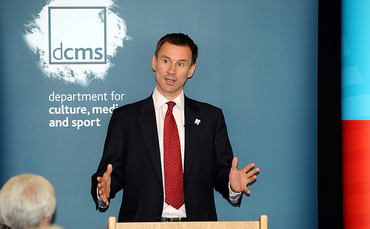
The UK is to have the fastest broadband network of all major European countries by 2015,culture secretary Jeremy Hunt has claimed.
Speaking at the Google Campus in Tech City,Hunt defended the government after criticism from a Lords committee that said that the government's fixation on delivering certain speeds to consumers has"had a detrimental effect on policy-making and the long-term national interest".
Further reading
Former BT CTO slams UK's'visionless'broadband plans Government,BT bite back in'visionless'broadband claims Ex-BT CTO hits back at government over'visionless'broadband rollout(UPDATED)House of Lords select committee slams UK broadband rollout Ambition deficit threatens UK broadband goals
In response Hunt said:"We simply will not have a competitive broadband network unless we recognise the massive growth in demand for higher and higher speeds.But where[the committee]is wrong is to say my focus is on any particular speed:today's superfast is tomorrow's superslow.
"Just as the last government was wrong to hang its hat on 2Mbit/s speeds,we must never fall into the trap of saying any speed is'enough',"he added.
In 2010,Hunt had stated that by 2015,the government wanted Britain to have the best superfast broadband network in Europe.Today he said that the network will be the fastest of any major European country by 2015.
The government has also been heavily criticised for concentrating on fibre-to-the-cabinet(FTTC)as oppose to fibre-to-the-home(FTTH),and Hunt attempted to clear up this"misunderstanding".
"[The committee suggests that fibre to the cabinet is the sum of the government's ambitions.They are wrong,"he stated.
Hunt explained that FTTC,with broadband speeds of between 80Mbit/s to 1Gbit/s was a"temporary stepping stone"and"medium-term solution"towards FTTH.
FTTH would be available on demand to over two-thirds of the UK population by 2016,Hunt claimed,while stating that if FTTH is still the best way to get the very highest speeds"private-sector companies will invest to provide it".
"Let's look at the alternative:if the state were to build a FTTH network now,it would potentially cost more than£25bn.It would also take the best part of a decade to achieve.We will get there far more cheaply–and far more quickly–by harnessing the entrepreneurialism of private-sector broadband providers than by destroying their businesses from a mistaken belief that the state can do better,"he said.





